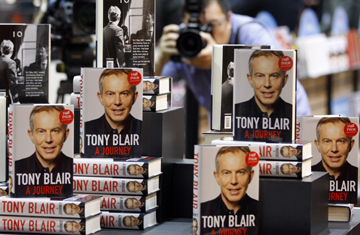
Copies of A Journey, the memoirs of former British Prime Minister Tony Blair, are on display at a bookstore in London on Sept. 1, 2010
History, it seems, is no longer written by the victors but by those who get their memoirs onto the bookshelves first. And Britain's most electorally successful Labour leader, former Prime Minister Tony Blair, has seized his moment.
It's been just three years since Blair was forced from office early by his own party, and only four months since his successor and tormentor, Gordon Brown, ended Labour's 13 years in power by losing the May 2010 general election. But already, Blair has produced A Journey: My Political Life, his revealing and intimate account of Labour's reign, backing it with his first major interview since he left 10 Downing Street.
So we read that Blair believes Labour lost in May because under Brown — of whom Blair says he always knew would be a "disastrous" Prime Minister — the government turned away from the Blairite New Labour agenda of public-services and welfare reform.
Blair confirms what everyone knew but was always dismissed by his spin doctors: his relationship with Brown, once his chief finance minister, had for years been broken virtually beyond repair, and Blair held back from sacking Brown only out of fear that the Scot would be more powerful, dangerous and left wing outside the Cabinet. Blair even claims credit for what was believed to have been Brown's most radical policy: giving independence to Britain's central bank as a first act after Labour's 1997 landslide election victory.
And with impeccable timing, Blair steps into the current election campaign for a new Labour leader — which was launched on Wednesday, the day of the book's publication — by insisting that the party should stick with the centrist, New Labour theme of change. "The danger for Labour now is that we drift off, or even move decisively off, to the left," Blair writes. "If we do, we will lose even bigger next time. We have to buck the historical trend and face up to the reasons for defeat squarely and honestly."
The book has met with a mixed response. Some commentators have described it as a "fascinating, well-written and revealing" read from the longest-serving Labour Premier ever. Others dismiss it as a "self-serving, divisive and one-sided" account of his time in power and a blatant attempt to justify his actions, like the war on Iraq, after the event.
Perhaps most significantly, all five contenders in the election to be the new Labour leader — brothers and former ministers Ed and David Miliband, Ed Balls, Andy Burnham and left winger Diane Abbott — have expressed reservations, or downright anger, about the book and its timing, with all of them suggesting that it is time to move on from the Blair era. "I am my own person," said former Foreign Secretary David Miliband, widely accepted as Blair's favored candidate during a TV leadership debate on the evening of the book's publication. "I look forward to the day when Tony says he is a Milibandite rather than people asking me whether I am a Blairite." And former minister Burnham said, "It really saddens me that battles of the past are being brought to bear on this leadership election."
Unsurprisingly, it is the details of the relationship between Blair and Brown, the two most powerful men in the last government, that has produced the most headlines. In A Journey Blair describes Brown variously as "maddening," "strange" and with "zero emotional intelligence," saying he became near impossible to work with. "Was [Gordon] difficult, at times maddening? Yes," Blair writes. "But he was also strong, capable and brilliant, and those were qualities for which I never lost respect."
Blaire may not have lost respect for those qualities, but he clearly lost his patience with the man who was constantly pressing him to stand aside, revealing in one sharply funny passage that he even stopped taking calls from him: "Poor Jon [an adviser] would come in and say: 'The chancellor really wants to speak to you.' I would say: 'I am really busy, Jon.' And he would say: 'He is really demanding it.' Then I would say: 'I'll call him soon.' And Jon would say: 'Do you really mean that, prime minister?' And I would say: 'No, Jon.' "
To the dismay of his critics, nowhere in A Journey does Blair express regret over his decision to go to war in Iraq, which has done more to define his premiership and legacy than any other. "I am unable to satisfy the desire even of some of my supporters, who would like me to say: it was a mistake but one made in good faith," he writes.
Nor is there any recanting of his controversial — among many Labour supporters — backing for a Republican U.S. President, George W. Bush, on whom Blair heaps lavish praise. "I was asked recently which of the political leaders I had met had the most integrity. I listed George near the top," he says in his book. " Some people were aghast, thinking I was joking. He had genuine integrity and as much political courage as any leader I ever met. He was, in a bizarre sense, a true idealist."
Brown has refused to comment on the book, but close friends say he is deeply unhappy at the way he has been portrayed, and they have branded the book "unfair and one-sided."
Whatever Blair intended by publishing his memoirs before the wounds of Labour's loss have had time to heal, his attempt to write the history of the longest Labour administration ever seems unlikely to go unchallenged. Brown has signaled that he has no intention of producing his own version of these fascinating and extraordinary events. But many now wonder if he will continue to resist the desire to write Labour's history his way.
